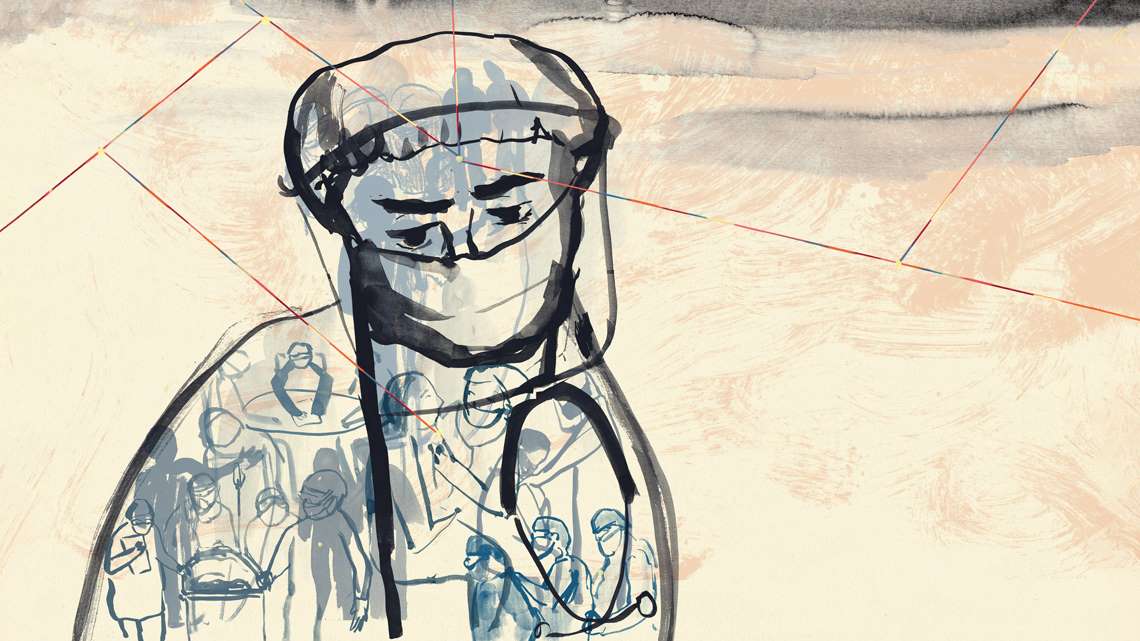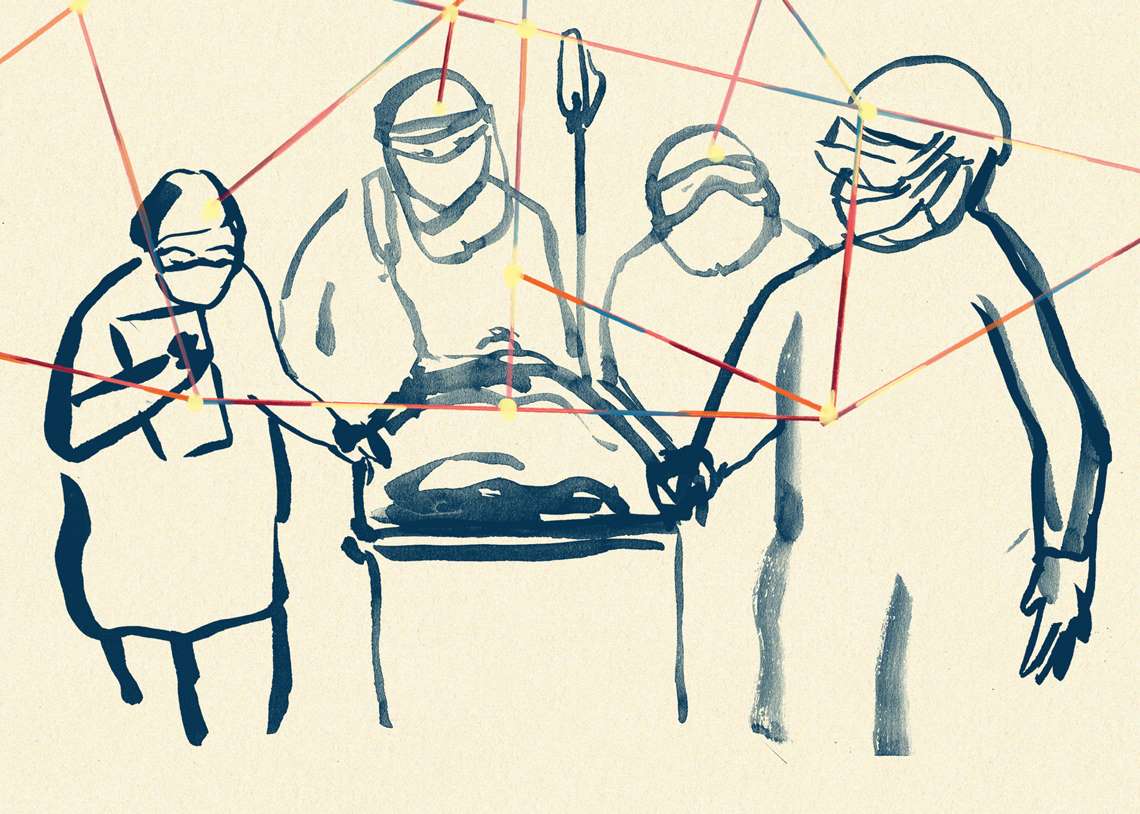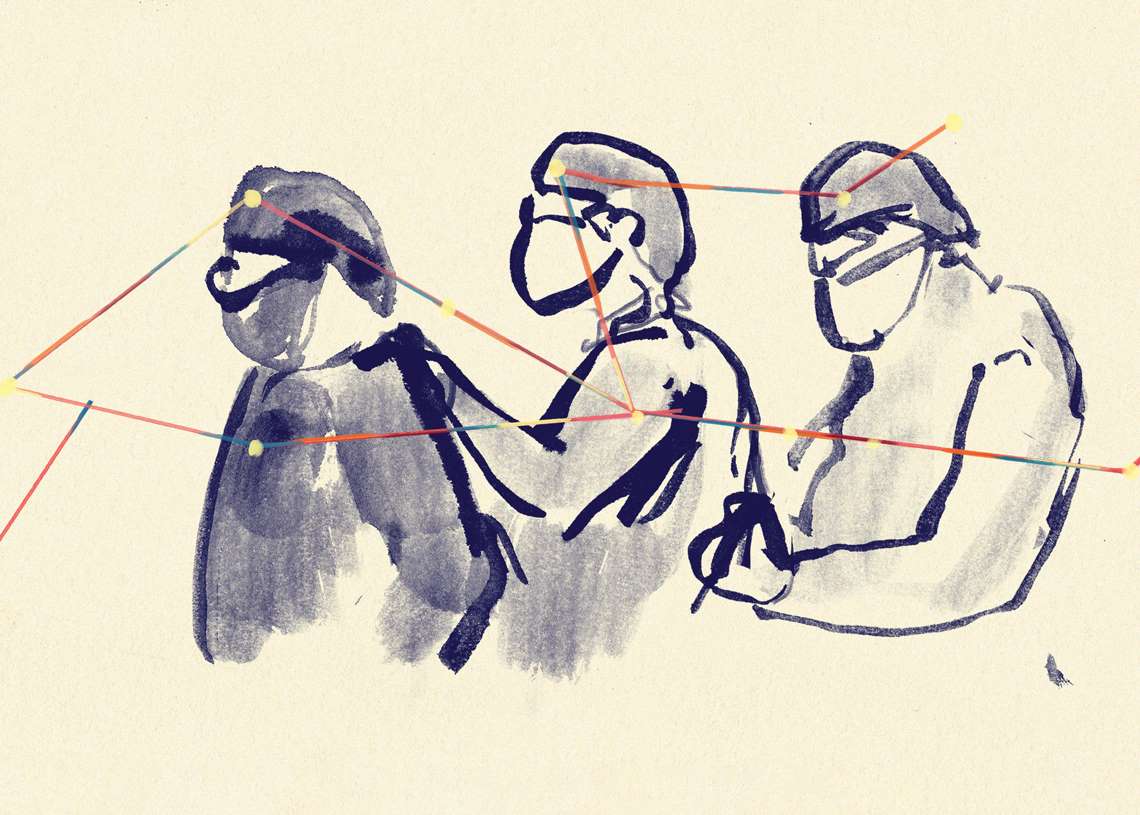Over the last year, the pandemic has posed new challenges to the field of bioethics—the systematic study of the moral dimensions of life sciences and health care. With the goal of helping medical teams make decisions involving complex clinical cases, hospital bioethics committees have been offering subsidies to qualify discussions on the allocation of funds in a context of collapsing health care systems. They have also been playing new roles, including giving opinions and suggestions on how to organize the distribution of vaccines across the population. Despite their relevance, less than 10% of Brazilian hospitals have these committees, as found in a study by researchers from the Bahia School of Medicine and Public Health and the Bahia Regional College (UNIRB). According to the National Health Confederation (CNS), Brazil had around 6,700 hospitals in 2019.
Doctor and bioethicist Reinaldo Ayer de Oliveira from the University of São Paulo School of Medicine (FM-USP)—who also coordinates the research group on Bioethics, Law, and Medicine at the institution—explains that, historically, hospital bioethics committees have helped medical staff through extreme clinical situations, especially in end-of-life processes, supporting their decision making. He shares that the first hospital bioethics committees began in the United States in the 1960s and 1970s, becoming more popular during the 1990s. Later, in 2005, the Universal Declaration on Bioethics and Human Rights helped spread them to other countries. “In Brazil, these committees are still scarce because we do not have any guidelines from the Federal Council of Medicine (CFM) nor any laws that dictate their existence, as occurs in the United States,” compares the researcher, who is also secretary of the Brazilian Society for Bioethics (SBB) and a member of the bioethics committee at Hospital do Coração (HCor), in São Paulo. In 2017, the Regional Council of Medicine for the State of São Paulo (CREMESP) carried out a survey which revealed that, out of the 967 hospitals in the state, only 18 had bioethics committees. The CFM published a document in 2015 that “recommends the establishment, operation, and involvement of doctors in bioethics committees.” In 2020, the SBB, with the increase in serious COVID-19 cases, reinforced the need for hospital bioethics committees.
Dr. Mário de Seixas Rocha, from the Bahia School of Medicine, was one of the authors of a study that carried out a systematic literature review to assess the role of bioethics committees in the resolution of hospital conflicts in Brazil. According to Dr. Rocha, some health care institutions are resistant to establishing these committees due to concern they will audit and punish any medical mistakes. Usually made up of health care professionals, such as doctors, psychologists, and nurses, as well as lawyers, philosophers, sociologists, and other professionals, these committees can play a deliberative or advisory role, debating conflicts through a transdisciplinary approach. “The existence of these groups in health care institutions alleviates the stress of medical professionals, especially during the pandemic, when life or death decisions are made daily,” he highlights, pointing out that, in the United States and Canada, 90% of hospitals have these committees; in Japan, 50% of hospitals have them. Rocha cites a 2014 article published in Revista Bioética (Bioethics journal), which reveals that, in European countries such as Germany, Italy, and the Netherlands, bioethics committees—called Clinical Ethics Consultation—were implemented through an official initiative by the government or through institutional measures. “In these countries, around 80% of hospitals have bioethics committees,” he states.
Reconciling the affirmation of each person’s dignity with the need to be rational when using scarce resources is a key challenge for bioethics
The allocation of resources, which used to be a closed debate inside health care institutions but became public with the pandemic, represents a historical discussion in the field of bioethics, says doctor Chin An Lin, chairman of the bioethics committee of the Clinical Board of Hospital das Clínicas (HC) at FM-USP. One of the first in the country, the HC committee, was founded in 1996 to discuss conceptual issues that can help establish institutional norms. Other pioneering experiences were those of groups from the Hospital de Clínicas of Porto Alegre, in 1993, and the Hospital São Lucas at the Pontifical Catholic University of Rio Grande do Sul (PUC-RS), in 1997. The HC committee frequently debates individual cases where exceptional and expensive treatments are needed, which can use up resources assigned to areas that serve a greater number of people. “The pandemic revealed historical issues regarding the population’s access to health care, in addition to posing new challenges for the committees,” according to Lin, one of the authors of a 2020 article published in the journal Clinics, which proposes theoretical frameworks for decision-making in patient care and for allocating health care resources.
One such challenge—managing access to ICU beds—is a central issue in the care of critical COVID-19 patients. Lin explains that, at the beginning of the pandemic, the HC quickly made new ICU beds available, which helped meet the demand for intensive care. But now, with the looming possibility of bed shortages, there is a need to reprioritize. The situation sparked debate among the members of the committee, which is looking to define the fairest way to allocate hospital resources based on bioethical discussions involving the principles of autonomy, justice, nonmaleficence—doing no harm—and beneficence, or doing good. He shares that, faced with a scenario of an overburdened health care system, the committee proposed criteria that considers both the severity of the condition and the real chances of survival. The researcher explains that the HC committee has two mechanisms to solve bioethical conflicts. The first is an immediate care system for urgent cases, while the second involves decisions in clinical cases or non-urgent situations, which require broader deliberation and for which opinions are issued within a month. “If a patient with little chance of surviving remains in the ICU for 10 days, this bed will be unavailable to patients with higher chances of survival,” he illustrates. “Because of this, when faced with the absolute scarcity of ICU beds, we propose that, in addition to the severity of the condition, the medical staff should also consider the likelihood of the patient returning to a productive life in society. It is a very painful discussion—a true case of ‘Sophie’s Choice,’” says Lin. The doctor is referring to the famous novel by American author William Styron (1925–2006), Sophie’s Choice (1979), about a Polish woman imprisoned with her two young children in the Auschwitz concentration camp during World War II. In the story, Sophie was made to either choose one of her children to be saved from execution or let them both die, forcing her to make a horrific decision.
A researcher of bioethics since 1996, theologian Mário Antonio Sanches, from the Pontifical Catholic University of Paraná (PUC-PR), explains that, given the lack of beds, choosing patients with the highest chances of survival can be justified based on different schools of bioethics—as long as one does not argue that a person’s life is worth more than another’s. “The challenge for a hospital bioethics committee is to reconcile the affirmation of each person’s dignity with the need to be rational when using scarce resources,” explains the theologian, who authored an article alongside other researchers from PUC-PR on the role of bioethics in facing pandemic-related conflicts.
On the other hand, Dr. Sérgio Rego, from the Oswaldo Cruz Foundation National School of Public Health (ENSP-FIOCRUZ), points out that there are still no studies that prove a direct correlation between severe cases of COVID-19 and their prognosis. “Bioethical conflicts arise in debates on individual rights versus collective interests. To resolve these dilemmas, we must find reasons that justify who should lose,” ponders the researcher, who coordinates a bioethics thematic group at the Brazilian Association of Collective Health (ABRASCO). Based on the utilitarian principle, medical professionals have also been prioritized when it comes to ICU beds, according to pharmacist and lawyer Gustavo da Cunha Lima Freire, from the Federal University of Rio Grande do Norte (UFRN). “According to these guidelines, health care professionals must be given priority because, when they return to work, society as a whole benefits,” he explains.
In a scenario where daily COVID-19 deaths are at nearly 3,000, health care professionals are having to make Sophie’s choices at every turn. “Two of my children are doctors; one of them is an intensive care provider. I can see how making these decisions alone takes an enormous toll on them,” observes Dr. José Eduardo de Siqueira, from PUC-PR, an advisory member of Redbioética, of the United Nations Educational, Scientific and Cultural Organization (UNESCO) in Latin America and the Caribbean. Siqueira mentions studies that show going through stressful and painful situations can lead to an increasing rate of depression among medical staff. One such study, “Working conditions of health care professionals in the context of COVID-19,” was carried out by FIOCRUZ in 2020. Coordinated by sociologist Maria Helena Machado, about 16,000 health care professionals were surveyed, of whom 22.2% claimed to have an exhausting work routine, 15.8% cited having sleep problems, and 13.6% reported experiencing irritability, frequent crying, and other general issues. A 2019 survey of around 15,000 doctors, carried out by the website Medscape, pointed to an increase in depression and burnout among the participating professionals.
According to psychologist Suely Marinho, from the Psychiatry and Medical Psychology Service of the Hospital Universitário Clementino Fraga Filho, of the Federal University of Rio de Janeiro (HUCFF-UFRJ), health care workers need institutional support to make choices based on criteria that are transparent, inclusive, and fair, derived from ethical considerations and shared responsibilities. “Managing clinical situations amid a collapsing health care system requires an effort to integrate public health ethics and clinical ethics, that is, individual interests and collective demands,” points out Marinho, who is also 2nd vice president of the Brazilian Society for Bioethics – Rio de Janeiro Branch. In a document posted on the ABRASCO website, Marinho—alongside other researchers—explains that, for this dialogue to occur, there must be transparent communication between the various actors involved in the day-to-day activities of hospitals, and bioethics committees have been conducive spaces for these actions.
Based on the experience of the HCor committee through dialogue with active researchers and other groups, Oliveira, from FM-USP, explains that in the first months of 2020, institutions with an adequate budget and more room to deliberate, such as Hospital Israelita Albert Einstein or HC-USP, experienced fewer bioethical conflicts, insofar as they were able to prepare their staff and increase the number of beds, implementing triage procedures that helped reduce the need for intensive care. Along with Lin, he co-authored the article published in Clinics, proposing theoretical frameworks for medical decision making. Prospects changed when the pandemic worsened, in February 2021, when the committees were consulted with greater frequency. “The existence of these committees in hospitals helps decision making, reducing staff stress levels and helping to think about moral situations that arise in conflict with the socio-familial sphere, or even with the medical staff, requiring choices that must be evaluated in all their complexity,” explains Dr. Maria Alice Scardoelli from CREMESP. The medical staff can ask the committees for recommendations in individual cases and in the development of institutional norms for general patient care.
In addition to most Brazilian hospitals not having these committees, Siqueira, from PUC-PR, points out another issue: the medical training itself, which underestimates the need to teach about the deliberative process of clinical decision-making in the face of complex moral dilemmas between doctors and patients. “Programs in the life sciences prioritize technical content and have little room for fields such as anthropology and philosophy, which help bring back the humanistic and humanitarian commitments of these professions,” he analyzes. Siqueira cites countries, like France, Portugal, and Italy, that have national bioethics committees to advise presidents or prime ministers. Brazil boasts more than 400 medical schools and, according to Siqueira, these programs are usually 9,000 to 11,000 hours long at the undergraduate level. Of these, only 80 hours are spent on areas such as ethics or bioethics. “CFM is making efforts to change the medical culture, encouraging professionals to seek committees when they face clinical and moral dilemmas,” shares Siqueira, who is part of the CFM Medical Humanities committee.
Attentive to this gap in medical training, Freire, from UFRN, alongside undergraduate medical student George Felipe de Moura Batista, analyzed how the 50 best medical schools in the country—according to the results of the 2017 Folha University Ranking (RUF)—incorporate discussions on thanatology, the scientific study of death, in their curricula. “We found that more than 70% of them do not cover the subject or cover it superficially. Programs in the health care field, especially medical programs, should better prepare graduating professionals to handle death,” defends Freire, who, alongside colleagues, established a course in 2015 to teach the university’s students about the fundamentals of bioethics and thanatology.
Similarly, Rego, from FIOCRUZ, perceives that challenges in handling death results in some doctors insisting on invasive treatments for patients who cannot be saved. “I have heard students claim that they refuse to declare a patient dead and that, if their patients die, they make efforts to revive them, even when they know chances of survival are minimal,” he shares, pointing out that the World Medical Association only began recommending the teaching of ethics in medical schools in 1999. For Rego, this attitude is related to the fact that many health care workers shy away from the debate about when to make efforts to revive a person. It also relates to the lack of transparent criteria to guide medical decision making in cases of resuscitation or terminally ill patients. “Medical training favors specialization, promoting expertise in diseases and parts of the human body while disregarding the patient’s real life. This makes it difficult to discuss issues like these in daily work routines,” says Rego.
University programs in the life sciences should incorporate content that helps bring back the humanistic and humanitarian commitments of these professions
Faced with situations in which the families of terminally ill individuals were unable to say goodbye, the HC-USP bioethics committee began questioning the ban on visits to COVID-19 patients and seeking strategies that would alleviate their suffering without risking other people. “Guided by the committee, medical staff began providing daily updates to the patients’ family members by phone and allowing them to meet online,” says Lin. “Patients usually spend a week to 50 days in the ICU. Allowing online meetings with loved ones was our solution to humanize this type of situation,” he explains.
In addition to issues related to the allocation of health care resources, the pandemic motivated the committees to expand their duties. In this regard, Oliveira, from FM-USP, cites the debates surrounding the idea of letting the private sector acquire the vaccine, which involved groups from different institutions. The recommendations of the bioethics committee of Hospital Sírio-Libanês became a benchmark. They advised that vaccines should be available for purchase by private companies but must be donated in their entirety to the Unified Health System (SUS).
Pharmacist and biochemist Sérgio Surugi de Siqueira, from PUC-PR—a member of the National Committee of Ethics in Research (CONEP)—highlights another controversial issue in the field of bioethics: vaccine surplus. He explains that some countries bought vaccines from several manufacturers when they were still prototypes, hoping that at least one of them would be successful. “Since many of them worked, some countries—like Canada—now have a surplus,” he says. According to Surugi, the extra doses should be redistributed. “However, this is a decision involving the sovereignty and politics of each country, requiring bioethical discussions to establish the criteria of who should receive them,” he notes, pointing out that the debates around the requirement of a vaccine passport—a document that could be adopted by some countries to authorize the entry of foreigners—has also sparked bioethics debates. “On the one hand, the passport could violate fundamental rights in countries that are unable to vaccinate all their citizens. On the other hand, it could minimize the risk of spreading the virus again,” ponders Siqueira, coauthor of an article on the role of bioethics in facing pandemic conflicts.
Treatments involving drugs that are authorized to treat certain diseases, but with no approved use against COVID-19, were also the subject of discussion by the committees. In early 2020, the CFM issued the opinion that doctors have the autonomy to prescribe medications as they see fit. “However, this ended up encouraging the use of medications without proven efficacy, which drew attention to the need to debate the limits of medical autonomy. As terrible as it is, the pandemic has provided opportunities to think publicly about these practices,” concludes Lin.
Scientific articles
BATISTA, G. F. de M. and FREIRE, G. da C. L. Análise do ensino da morte e do morrer na graduação médica brasileira. Brazilian Journal of Bioethics. Vol. 15, pp. 1–13. 2019.
LIN, C. A. Bioethical principles and values during pandemics. Clinics. Vol. 75. 2020.
ROCHA, M. de S. and ROCHA, S. A. Resolução de conflitos bioéticos no cenário hospitalar brasileiro: Uma revisão sistemática da literatura. Brazilian Journal of Bioethics. Vol. 15, pp. 1–12. 2019.
SANCHES, M. A. et al. Perspectivas bioéticas sobre tomada de decisão em tempos de pandemia. Revista Bioética. Vol. 28, no. 3. Brasília: July–Sept. 2020.
MARINHO, S. et al. Implementação de comitês de bioética em hospitais universitários brasileiros: dificuldades e viabilidades. Revista Bioética. Vol. 22, no. 1, pp. 105–115, 2014.
LIN. C. A. Scarce Resource Allocation for Critically ill Patients During the COVID-19 Pandemic: A Public Health Emergency in São Paulo – Brazil. Clinics. Vol. 76, pp. 1–4, Jan. 2021.


